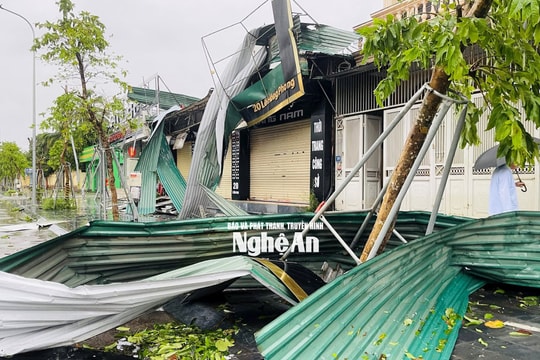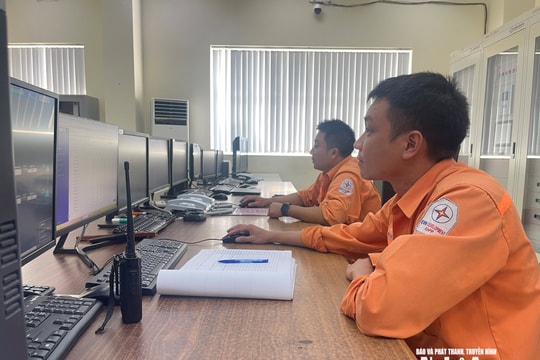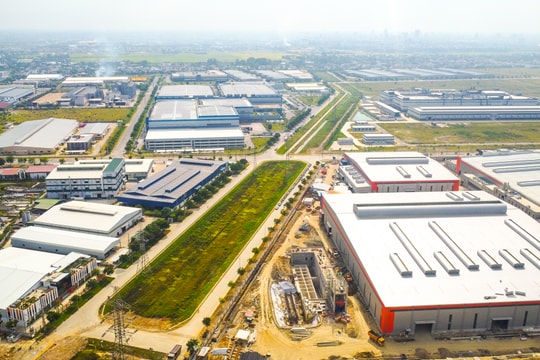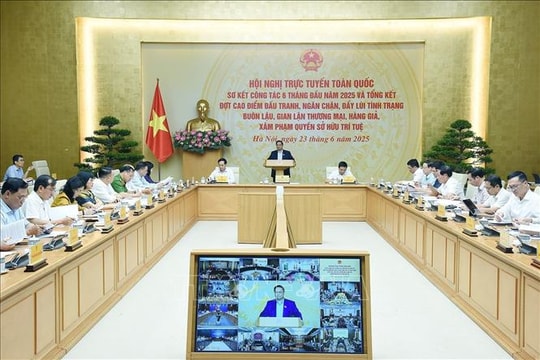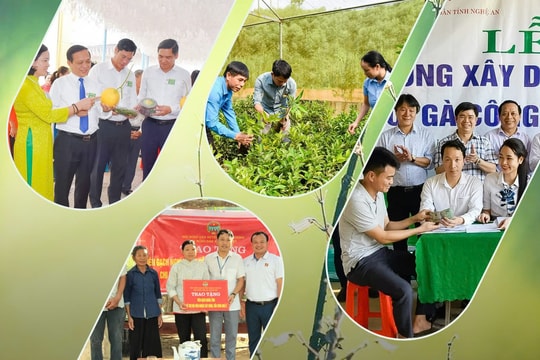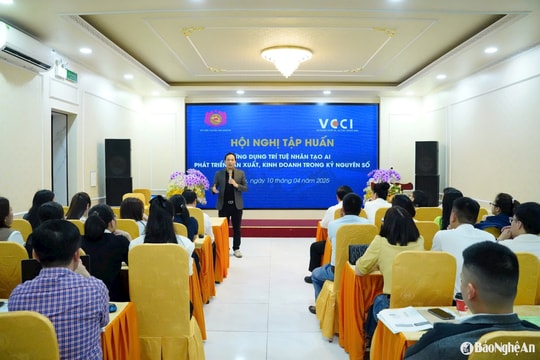The Government issued a Resolution to support businesses in adapting, recovering quickly, and developing sustainably.
The Government has just issued Resolution No. 58/NQ-CP dated April 21, 2023 on a number of key policies and solutions to support businesses to proactively adapt, recover quickly and develop sustainably by 2025.
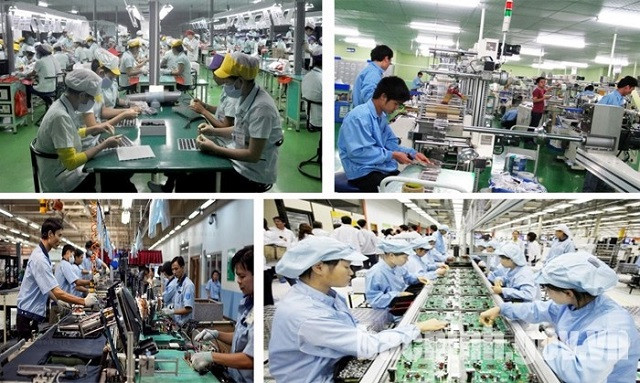 |
Some key policies and solutions to support businesses to proactively adapt, recover quickly and develop sustainably by 2025. |
The Resolution stated: In recent times, the COVID-19 pandemic and complex fluctuations in the world's geopolitics and economy have been greatly affecting our country's economy as well as the production and business activities of enterprises. In the context of unprecedented pressure, difficulties and challenges in the world situation, with limited resources, under the correct and close leadership of the Party, the accompaniment of the National Assembly, the joint efforts, unanimity and high determination of the entire political system, the cooperation and assistance of international friends, the Government and the Prime Minister have directed ministries, branches and localities to resolutely, uniformly and promptly implement many policies and solutions to maintain macroeconomic stability, control inflation according to the set targets, maintain reasonable exchange rates and interest rates, basically stable compared to major countries and in the region that are experiencing many fluctuations; significantly reduce the pressure on input costs of raw materials and fuels to remove difficulties for production and business.
Therefore, with the efforts to overcome difficulties, the spirit of innovation and proactive adaptation of the business community, production and business activities have shown many signs of recovery in recent times. The business sector still achieved encouraging growth even in the context of the complicated developments of the COVID-19 pandemic. The confidence of investors and businesses continues to be strengthened and tends to be positive.
However, the production and business situation in the coming time is expected to continue to face many difficulties: The impact of the COVID-19 epidemic is still present; the problem of climate change, droughts, and floods is happening abnormally; strategic competition between major powers; the Russia-Ukraine military conflict may be prolonged; the problem of inflation in many countries is likely to become a persistent problem in the medium term; the price of gasoline, fuel, and raw materials is still high; the slow and difficult recovery of major trading partners... In addition, the shift in value chains, requirements of partners and markets towards sustainable production and consumption, the trend of green economy, digital economy, and the 4.0 industrial revolution is taking place strongly; Vietnam's commitments when participating in the United Nations Framework Convention on Climate Change (COP26); The issue of carbon tax, carbon verification tools applied in many countries around the world... are requiring Vietnamese enterprises to innovate to keep up with new trends, otherwise they will lose competitiveness and lose the opportunity to go deeper into the global value chain.
In the coming time, the world, regional and domestic situation will have both advantages, opportunities and difficulties, and challenges intertwined. In order to achieve the goals set out in the Resolution of the 13th National Party Congress and complete the socio-economic development goals and targets for the 2021-2025 period approved by the National Assembly, Vietnam needs to strongly innovate the growth model, restructure the economy, perfect the socialist-oriented market economy; improve productivity, quality, efficiency and competitiveness of the economy; in which the business community plays the role of a pioneering, core and important force to successfully implement the set goals.
In order to support Vietnamese enterprises to proactively adapt, recover quickly and develop sustainably in both quantity and quality, truly becoming an important force to ensure the autonomy of the economy, the Government requests ministries, ministerial-level agencies, government agencies, and People's Committees of provinces and centrally run cities to resolutely and effectively implement the following viewpoints, goals, tasks and key solutions to support and develop enterprises.
OPINION
1. Thoroughly and effectively implement resolutions, guidelines, policies and guidelines of the Party and State on encouraging business development; protect the legitimate property rights and freedom of business of people and businesses according to the Constitution and laws; create development and control risks, improve the investment and business environment; do not criminalize economic and civil relations, and strictly handle all violations of the law; strengthen the trust of the business community and entrepreneurs; ensure equal rights for all businesses, regardless of type and economic sector, in accessing resources and policies.
2. Continue to accompany and provide maximum support for business development, considering removing barriers and difficulties for businesses as the top political task. Clear bottlenecks with the motto "as soon as possible, most effectively", mobilize and liberate social resources for investment and development. Promote the spirit of self-reliance, self-reliance, mobilize the strength of national solidarity, the participation of the entire political system and business community, and expand international cooperation.
3. Ensure the stability, consistency, predictability, clarity, transparency, effectiveness and substance of policies; continue to improve the investment and business environment towards openness, convenience, safety and friendliness, approaching international standards; simplify pre-inspection, strengthen post-inspection based on clear, transparent and reasonable standards and criteria; promote the application of technology and digital transformation in the state management agency system.
4. Proactively develop policies and prepare necessary resources to support businesses to proactively adapt to future fluctuations, promote innovation, improve competitiveness, and develop rapidly and sustainably.
5. Support key and focal businesses to anticipate new business trends; develop new business models based on innovation, digital economy, sharing economy, circular economy, green economy and sustainable business; promote the formation of businesses capable of leading in a number of potential industries and fields to create new growth drivers and achieve sustainable goals.
TARGET
General objectives:Support and develop businesses to proactively adapt to the new situation, stabilize production and business activities and recover quickly, innovate, develop sustainable production and business, improve competitiveness, participate deeply in production networks and regional and global value chains; grow in quantity and quality, contribute to building an independent, self-reliant economy, proactively and actively integrate deeply, substantially and effectively into the international economy.
Chalkboard goalfight until 2025:
a) Achieve 1.5 million enterprises; 8,000-10,000 business households converted into enterprises.
b) The business sector contributes about 65-70% of the country's GDP, about 30-35% of total employment in the economy, and 98-99% of total import-export turnover.
c) About 35-40% of total enterprises have activities applying science and technology and innovation.
d) 100% of business establishments including enterprises, cooperatives, and business households have their awareness of digital transformation raised; at least 30,000 business establishments are supported to carry out digital transformation.
d) Each year, increase by 10% the number of enterprises ranked in the list of enterprises with the highest brand value by prestigious ranking organizations in the world.
e) 100% of administrative procedures related to eligible enterprises are provided with online public services.
g) 80% of enterprises use trained workers.
TASKS AND SOLUTIONS
A. Tasks and solutions to be implemented in the short term: 1. Urgently remove legal obstacles and barriers to free up resources for investment in production and business
a) Ministries, branches and localities:
- Urgently review and remove obstacles for investment projects that have been licensed, have not been implemented, or are being implemented to unlock investment resources for production, business, and economic development; promote the implementation and disbursement of public investment capital.
- Review and facilitate the quick processing of investment and construction procedures for real estate projects in the area that have met all the conditions so that real estate and construction enterprises can promptly implement them according to the approved investment decisions to complete them soon and bring products to market.
b) The Ministry of Construction and the People's Committees of provinces and centrally run cities urgently study and propose solutions to remove difficulties in legality and construction investment procedures for real estate projects; continue to closely monitor the activities of the real estate market and capital mobilization of real estate and construction enterprises; study and supplement regulations on financial safety ratios for capital mobilization of real estate enterprises; report to the Prime Minister in the second quarter of 2023.
c) The Ministry of Transport, relevant ministries, branches and localities shall promote the implementation and disbursement of public investment capital to build socio-economic infrastructure, especially key and important national projects, to unlock resources for investment and production activities of enterprises, and to find solutions to reduce international sea freight costs for enterprises.
d) Ministry of Finance:
- Direct the General Department of Customs to preside over and coordinate with ministries, branches and localities to research and simplify current administrative procedures to the maximum or consider applying priority import and export procedures to support businesses in optimizing time and costs in domestic implementation stages to speed up the process and procedures for importing essential goods and speed up the export of agricultural products and key export groups.
- Continue to reform tax administration for individual business households to gradually reduce the difference between tax policies of enterprises and business households; report to the Prime Minister in the second quarter of 2023.
- Monitor and evaluate the performance of the corporate bond market according to the provisions of Decree No. 08/2023/ND-CP dated March 5, 2023 of the Government amending, supplementing and suspending the implementation of a number of articles in the Decrees regulating the offering and trading of individual corporate bonds in the domestic market and the offering of corporate bonds to the international market.
d) The Ministry of Natural Resources and Environment shall study and revise the provisions in the technical regulations on seafood processing wastewater in accordance with actual conditions, technological capabilities, specific factors of the industry and international practices, especially phosphorus indicators; consider developing separate technical regulations for aquaculture pond wastewater with regulations suitable to actual conditions and specific characteristics of the aquaculture industry; report to the Prime Minister in the second quarter of 2023.
e) Ministry of Agriculture and Rural Development:
- Take the lead in coordinating with relevant agencies and localities to research, promote and drastically implement solutions to overcome the European Union's IUU "yellow card", including improving regulations on logging and digitizing the inspection process - granting confirmation and certification of exploitation; report to the Prime Minister in the second quarter of 2023.
g) The Ministry of Construction shall preside over and coordinate with the Ministry of Public Security to study and review standards and regulations on fire prevention and fighting for construction projects; the Ministry of Public Security shall review standards on fire prevention and fighting, simplify procedures, create favorable conditions and reduce costs for businesses while still ensuring absolute safety; resolutely direct the fight against crimes related to black credit activities, report to the Prime Minister the results of three years of implementing Directive No. 12/CT-TTg dated April 25, 2019 of the Prime Minister on strengthening the prevention and fight against crimes and violations of the law related to black credit activities, to be completed in the second quarter of 2023.
h) The Ministry of Science and Technology shall preside over and coordinate with the Ministry of Finance and relevant agencies to study and amend regulations on changing the purpose of using the Science and Technology Development Fund of enterprises to perform the following tasks: investing in incubators in fields related to science, technology and innovation; ordering innovative products; investing in creative start-up enterprises; reporting to the Prime Minister in the second quarter of 2023.
i) The Ministry of Planning and Investment shall preside over and coordinate with ministries, branches, localities and business associations to study mechanisms and policies to encourage the formation of a private enterprise force with a leading role in a number of key economic sectors and fields with competitive advantages; report to the Prime Minister in the second quarter of 2024.
k) The Government Inspectorate shall preside over and coordinate with relevant ministries, branches and agencies to minimize inspection activities according to regulations, develop a Directive to replace Directive No. 20/CT-TTg dated May 17, 2017 of the Prime Minister on rectifying inspection and examination activities for enterprises; especially thoroughly reduce overlap in tax and social insurance inspection activities and other specialized inspection activities; submit to the Prime Minister in the second quarter of 2023.
2. Support cost reduction for businesses, increase access to preferential capital sources and state support resources
a) The Ministry of Finance shall preside over and coordinate with relevant agencies to:
- Continue to promote forecasting, effectively coordinate monetary and fiscal policies with other macroeconomic policies and balance the central budget to support a number of subjects heavily affected by gasoline prices such as supporting fishermen at sea, supporting transport businesses, and low-income people according to regulations.
- Continue to resolutely and effectively implement support solutions on taxes, fees, charges and land rents issued by competent authorities to implement the Socio-Economic Recovery and Development Program.
- Focus on researching, perfecting and submitting to competent authorities for decision to soon implement into practice solutions to reduce land rent for enterprises and organizations; continue to coordinate with ministries, branches and associations to review and submit to the Government to adjust export tax and import tax rates on input materials for production to support domestic production and business.
- Urgently issue a Circular guiding the mechanism for using state budget funds for regular expenditures to support small and medium-sized enterprises according to Decree No. 80/2021/ND-CP dated August 26, 2021 of the Government, to be completed in April 2023.
- Review and assess difficulties and obstacles in implementing Decree No. 34/2018/ND-CP dated March 8, 2018 of the Government on the establishment, organization and operation of credit guarantee funds for small and medium enterprises and propose solutions to remove them; report to the Prime Minister in the second quarter of 2023.
- Coordinate with the Ministry of Agriculture and Rural Development to find solutions to reduce costs of raw materials and input materials for agricultural and aquatic production, especially animal feed.
b) The Ministry of Agriculture and Rural Development shall coordinate with the Ministry of Finance to implement solutions to support the reduction of costs of raw materials and input materials for agricultural production, especially animal feed.
c) The Ministry of Construction shall guide and resolve, within its authority, or advise the Government and the Prime Minister to remove difficulties and problems related to project management, cost management, construction norms, construction materials, construction quality management and construction contracts; guide and inspect localities in announcing prices of common construction materials in the area according to the provisions of law in the second quarter of 2023.
d) Ministry of Industry and Trade:
- Strengthen monitoring and direction of key enterprises, petroleum distribution and trading to properly implement regulations on circulation reserves, avoid shortage of petroleum supply; proactively calculate and have solutions to be self-sufficient in domestic supply.
- Study and propose to amend Decision No. 28/2014/QD-TTg dated April 7, 2014 of the Prime Minister regulating the structure of retail electricity prices, study to add the subject of "tourist accommodation establishments" to apply retail electricity prices equal to retail electricity prices for manufacturing industries in the spirit of Resolution No. 08-NQ/TW dated January 16, 2017 of the Politburo on developing tourism into a spearhead economic sector; report to the Prime Minister in the second quarter of 2023.
- Develop and implement solutions for economical and efficient electricity use, focusing on load adjustment activities.
d) State Bank of Vietnam:
- Direct credit institutions to continue focusing credit capital on serving the production and business activities of enterprises, especially priority areas, encouraging development according to the policies of the Government and the Prime Minister; promote the implementation of Decree No. 31/2022/ND-CP dated May 20, 2022 of the Government on interest rate support from the State budget for loans of enterprises, cooperatives, and business households.
- Promote the development of non-cash payments and digital transformation; preside over and coordinate with relevant ministries and branches to complete the Decree on the mechanism for controlled testing of financial technology (Fintech) activities in the banking sector.
e) People's Committees of provinces and centrally-run cities:
- Develop and implement a plan to reduce water usage fees for local businesses.
- Speed up the construction of a rural transport system that both serves agriculture and helps rural workers get to factories to work every day; develop and expand suitable concentrated agricultural and aquaculture production areas.
- Announce prices of popular construction materials in the area according to authority and legal regulations; check, review and strictly manage construction material prices; direct affiliated agencies and units to regularly monitor and closely follow developments in the construction market to promptly update and announce construction material prices according to legal regulations.
3. Overcoming supply chain disruptions, diversifying export markets, and expanding domestic markets
a) The Ministry of Industry and Trade shall preside over and coordinate with ministries, branches, industry associations and foreign partner agencies to promote the implementation of activities to support enterprises in diversifying their supply sources, partners, suppliers of raw materials, fuel, accessories and input components to meet production and business needs; support industries and enterprises in responding to trade barriers, including trade defense measures; strengthen support for enterprises in improving their capacity to participate in global value chains, applying e-commerce in market access, diversifying export markets, directing the Trade Office system to actively support enterprises in connecting with partners and penetrating foreign markets, increasing the application of information technology, expanding the domestic market; restructuring goods and markets, avoiding dependence on certain markets; linking enterprises, using each other's goods, maintaining and dominating the domestic market; Coordinate with ministries, branches and localities to promptly support the removal of difficulties arising in the import and export of goods through border gates.
b) The Ministry of Foreign Affairs directs Vietnamese representative agencies abroad to actively support businesses in connecting with partners and penetrating markets; promote advocacy and encourage Vietnamese businessmen and intellectuals abroad to exchange, connect, cooperate in investment, business, and consumption of products and goods of Vietnamese enterprises in foreign markets.
4. Focus on supporting businesses to create opportunities and stabilize jobs for workers; promote the implementation of policies and solutions to support workers, train, retrain, and improve vocational skills for workers.
a) The Ministry of Labor, War Invalids and Social Affairs shall preside over:
- Complete guidelines on vocational training support for workers in small and medium-sized enterprises according to Decree No. 80/2021/ND-CP dated August 26, 2021 of the Government detailing a number of articles of the Law on Support for Small and Medium Enterprises, to be completed in the second quarter of 2023.
- Based on the actual situation, continue to review and research appropriate solutions to support labor in the business sector.
- Closely monitor the development of labor relations and labor fluctuations in enterprises, build a channel to collect information on the labor - employment situation and labor relations in the area; survey labor recruitment needs in enterprises to promptly connect labor supply sources in enterprises that have labor arrangement plans due to difficulties in finding orders to maintain production.
- Evaluate and advise competent authorities to issue policies and support training to improve professional skills and vocational skills for workers to be ready to adapt to job changes, if any.
b) The Vietnam Bank for Social Policies continues to promote the implementation of preferential loan programs for priority subjects in the Economic Recovery Program.
c) Localities speed up the disbursement of housing support packages for workers; promote the application of information technology and provide specific instructions to businesses in the process of managing and reviewing documents on the online system, creating convenience for workers and businesses to benefit from support policies.
B. TASKS GROUP, MEDIUM AND LONG-TERM SOLUTIONS
1. Continue to improve the business investment environment, reduce and simplify regulations related to business activities
a) Ministries, branches and localities:
- Focus on resolving shortcomings due to unclear, overlapping and contradictory regulations in legal documents in the fields of investment, land, construction, natural resources and environment; integrate legal documents to ensure consistency, synchronization, transparency, ease of reference, understanding and accessibility of the legal system; proactively or propose competent authorities to reduce or simplify regulations that create new barriers causing difficulties for investment, production and business activities, except in necessary cases and must assess the impact on enterprises. Review administrative procedures related to enterprises in the direction of simplification or appropriate changes to effectively apply digital technology and deploy online public services.
- Develop and submit to competent authorities for promulgation plans in the fields and areas of management as a basis for enterprises to develop investment, production and business plans and strategies with long-term and sustainable vision.
- Promote the implementation of Decision No. 882/QD-TTg dated July 22, 2022 of the Prime Minister on Approving the National Action Plan on Green Growth for the 2021-2030 period, Decision No. 687/QD-TTg dated June 7, 2022 on the Circular Economy Development Project in Vietnam, Decision No. 167/QD-TTg dated February 8, 2022 on the Program to support private sector enterprises in sustainable business for the 2022-2025 period.
- Organize regular dialogues between ministries, branches, local authorities and enterprises to promptly resolve difficulties and obstacles; assess the actual process of handling recommendations from the business community; improve the efficiency of public investment; encourage investment from the business sector to contribute to rapid and sustainable economic growth.
b) Ministry of Industry and Trade:
- Promote the implementation of the Domestic Market Development Project in conjunction with the Campaign "Vietnamese people prioritize using Vietnamese goods in the period 2021-2025", the Trade Development Program for mountainous, remote and island areas in the period 2021-2025", and the National E-commerce Development Program to stimulate domestic consumption.
- Develop and implement solutions to develop a number of large domestic retail corporations that are competitive in the region, play a core role, and lead the market according to the Domestic Trade Development Strategy for the period up to 2030, with a vision to 2045; research, develop and submit to competent authorities for promulgation development strategies for the following industries: textiles, footwear, automobiles, steel, paper, milk, plastics, etc. as a basis for businesses to develop long-term, sustainable business plans and strategies.
c) The Ministry of Justice effectively organizes the implementation of the Inter-sectoral Legal Support Program for small and medium-sized enterprises for the period 2021 - 2025.
d) The State Bank of Vietnam creates a stable and safe monetary and banking business environment, encourages healthy competition, ensures discipline, order, the rule of law and respects market rules; actively and flexibly operates monetary policy, and coordinates synchronously and effectively with fiscal policy and other macroeconomic policies to control inflation.
2. Promote digital transformation and innovation in businesses
a) Ministry of Planning and Investment:
- Promote the implementation of support for businesses in digital transformation according to the Law on Support for Small and Medium Enterprises to improve the efficiency of production and business activities, capacity and competitive advantages of businesses.
- Effectively operate the National Innovation Center to support and develop the startup and innovation ecosystem, contributing to the innovation of the growth model on the basis of science and technology development; effectively organize the annual Forum connecting the Vietnam Innovation Investment Fund and the National Innovation Network.
b) Ministry of Information and Communications:
- Accelerate the implementation of the National Digital Transformation Program to 2025, with a vision to 2030, and the National Strategy on the Development of Vietnamese Digital Technology Enterprises to 2030; build new infrastructure (such as 5G networks, data centers, etc.).
- Research and develop a transparent mechanism for open data sources in the public sector to facilitate technology businesses in accessing digital resources to develop innovative products and services.
c) Ministry of Science and Technology:
- Research and promote the development of science and technology enterprises, continue to support enterprises that are eligible to enjoy policies on corporate income tax, land, and credit according to regulations.
- Research, propose and effectively implement programs to support the development of science and technology enterprises, and national programs under the management of the Ministry of Science and Technology.
d) The Ministry of Agriculture and Rural Development shall take the lead in coordinating with ministries, branches and localities to promote digital transformation in the agricultural sector, mobilize social resources, and specify specific targets for each stage and implementation roadmap.
d) People's Committees of provinces and centrally run cities develop plans and arrange resources to support businesses, especially small and medium-sized enterprises in the area, to carry out digital transformation, innovation, and technology transfer suitable for businesses.
3. Support labor restructuring, improve human resource quality to meet the requirements of innovation and the 4.0 industrial revolution
a) Ministry of Labor, War Invalids and Social Affairs:
- Coordinate with the Ministry of Information and Communications to apply information technology to organize job fairs, support employers in recruiting online; organize connection activities, job fairs with links between localities in the region, inter-regionally or nationwide; invest in forming a modern online job fair to directly connect workers and employers, without geographical barriers.
- Research on part-time labor policies in the agricultural and fishery sectors to facilitate businesses in recruiting seasonal workers while solving employment and reducing poverty for farmers.
- Promote the implementation of solutions, policies and training programs for skilled human resources for businesses.
- Diversify capital sources to promote the creation of new jobs, high-quality jobs, sustainable jobs, green jobs, serving digital transformation, responding to climate change, and jobs for disadvantaged groups and remote areas.
b) The Ministry of Planning and Investment shall preside over and coordinate with the Ministry of Education and Training, the Ministry of Labor, War Invalids and Social Affairs, and the Ministry of Science and Technology to promote the implementation of human resource development activities to serve innovation and the 4.0 Industrial Revolution.
c) People's Committees of provinces and centrally run cities develop plans and allocate annual resources to implement activities to support training, business start-up consulting, improve corporate governance capacity for business management teams; improve skills, and change industries and occupations for workers.
4. Enhance the effectiveness of implementing policies and resources to support businesses in improving their competitiveness, proactively integrating internationally, and capturing and anticipating new business and market trends.
a) The Ministry of Planning and Investment continues to promote the implementation of the Law on Support for Small and Medium Enterprises with a focus on supporting enterprises to transform from business households, start-ups, innovation, digital transformation, and participate in value chain clusters; deploy the Program to support private sector enterprises to conduct sustainable business for the period 2022-2025, including supporting enterprises to apply circular economic models, inclusive business and sustainable business.
b) The Ministry of Finance shall prioritize balancing and allocating regular state budget expenditures to implement policies to support enterprises in sustainable production and business, transforming structure and technology towards modernity, and reducing carbon emissions in accordance with the provisions of the State Budget Law and relevant legal documents.
c) The Ministry of Industry and Trade shall promote the implementation and diversification of national trade promotion programs, national industrial promotion, domestic market development, and national brand building; strengthen training, consulting, and information provision for businesses to take advantage of free trade agreements, grasp the requirements, technical conditions, sustainable business, and carbon emission reduction of partners and international markets; effectively deploy an early warning trade information system to provide information for businesses to avoid anti-dumping lawsuits, or related information when approaching export markets.
d) The Ministry of Agriculture and Rural Development shall coordinate with the Ministry of Industry and Trade to promote the implementation of solutions to support the formation and development of production, processing, consumption, export and traceability chains for essential goods, agricultural products and foods, taking advantage of the purchasing power of the domestic market; study and propose the development of domestic raw material areas for agricultural production to replace imported raw materials in order to proactively control supply and prices.
d) The State Bank of Vietnam directs credit institutions to focus on lending capital to enterprises investing in the green economic sector, reducing carbon emissions to serve green growth goals in accordance with the law.
e) People's Committees of provinces and centrally run cities prioritize budget allocation to support small and medium-sized enterprises, focusing on supporting small and medium-sized enterprises transforming from business households, small and medium-sized enterprises starting up creatively, participating in industry clusters, value chains, small and medium-sized enterprises owned by women, small and medium-sized enterprises employing many female workers, small and medium-sized enterprises that are social enterprises, and small and medium-sized enterprises doing sustainable business.
This Resolution takes effect from April 21, 2023 and replaces Resolution No. 35/NQ-CP dated June 15, 2016 of the Government on supporting and developing enterprises until 2020.

